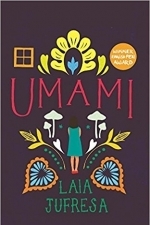Search
My rating 3.5
<i>I received this book for free through Goodreads First Reads.</i>
Written by the English Pen Award winner Laia Jufresa (and excellently translated by Sophie Hughes) <i>Umami</i> is a story of the troubled lives of a small community in Mexico as they go through various stages of grief. What this story reveals is that everyone deals with heartache in his or her own personal way, however the things they do can affect everyone around them.
Set in Belldrop Mews, Mexico City, five characters give an account of their own experiences over a five-year period, which when combined together produce an overview of life within the mews. Firstly there is Ana (2004), a preteen determined to plant her own garden in the depressing back yard of her family home. Despite her steps to do something positive, she and her family are still mourning the death of her little sister Luz who drowned a few years ago. The second perspective comes from Marina Mendoza (2003), a young adult artist suffering from an eating disorder whilst dealing with memories of her childhood.
Alfonso, the aging owner of the mews, begins his story in 2002 a couple of years after the death of his wife. Previously he was an anthropologist obsessed with the concept of <i>umami</i>, a Japanese word meaning <i>“a savory taste; one of the five basic tastes.”</i> He is an old soul that has fallen into depression, feeling, like Ana, a misfit. The final two narrators are young girls: Pina (2001) who is Ana’s best friend, and Luz (2000), Ana’s five year old sister shortly before she died. Both speak of loneliness as they look at the world through childishly naïve eyes. Pina is suffering the effects of her parents’ constant fighting, whereas Luz is crying out for attention from her family who will not let her join in the “big girl” activities.
<i>Umami</i> may not be a happy book but it has a very powerful voice. None of the characters have yet completely recovered from their experiences however they are all (barring Luz) making positive progress. Without knowing it, each member of the Belldrop Mews community is encouraging the rest as they drag themselves out from the depths of their despair – some by aspiring to be like another, and others listening to what their neighbours are telling them.
The message of this story is about the benefits of a community. Whether big or small, being within a group of people can prevent you from wallowing in your dark feelings and begin to continue with your life instead. This is something that the world at large would profit from.
The unconventional style of <i>Umami</i> may not be agreeable with some readers due to its lack of a clear beginning, middle and end. In fact it does not have a conclusion at all, leaving nothing fully resolved. Yet Jufresa did not intend it to end “happily ever after,” real life is not like that; but what is true is that with time and exposure to positive relationships things can get better.
The aspect preventing a higher rating is the occasional allusion to sexual content, especially from the mouths of girls too young to fully understand the concept. This was uncomfortable to read, however thankfully the majority of the novel was free of unpleasant imagery. <i>Umami</i> is down to earth, relatable and moving; Laia Jufresa is definitely an author to watch.
<i>I received this book for free through Goodreads First Reads.</i>
Written by the English Pen Award winner Laia Jufresa (and excellently translated by Sophie Hughes) <i>Umami</i> is a story of the troubled lives of a small community in Mexico as they go through various stages of grief. What this story reveals is that everyone deals with heartache in his or her own personal way, however the things they do can affect everyone around them.
Set in Belldrop Mews, Mexico City, five characters give an account of their own experiences over a five-year period, which when combined together produce an overview of life within the mews. Firstly there is Ana (2004), a preteen determined to plant her own garden in the depressing back yard of her family home. Despite her steps to do something positive, she and her family are still mourning the death of her little sister Luz who drowned a few years ago. The second perspective comes from Marina Mendoza (2003), a young adult artist suffering from an eating disorder whilst dealing with memories of her childhood.
Alfonso, the aging owner of the mews, begins his story in 2002 a couple of years after the death of his wife. Previously he was an anthropologist obsessed with the concept of <i>umami</i>, a Japanese word meaning <i>“a savory taste; one of the five basic tastes.”</i> He is an old soul that has fallen into depression, feeling, like Ana, a misfit. The final two narrators are young girls: Pina (2001) who is Ana’s best friend, and Luz (2000), Ana’s five year old sister shortly before she died. Both speak of loneliness as they look at the world through childishly naïve eyes. Pina is suffering the effects of her parents’ constant fighting, whereas Luz is crying out for attention from her family who will not let her join in the “big girl” activities.
<i>Umami</i> may not be a happy book but it has a very powerful voice. None of the characters have yet completely recovered from their experiences however they are all (barring Luz) making positive progress. Without knowing it, each member of the Belldrop Mews community is encouraging the rest as they drag themselves out from the depths of their despair – some by aspiring to be like another, and others listening to what their neighbours are telling them.
The message of this story is about the benefits of a community. Whether big or small, being within a group of people can prevent you from wallowing in your dark feelings and begin to continue with your life instead. This is something that the world at large would profit from.
The unconventional style of <i>Umami</i> may not be agreeable with some readers due to its lack of a clear beginning, middle and end. In fact it does not have a conclusion at all, leaving nothing fully resolved. Yet Jufresa did not intend it to end “happily ever after,” real life is not like that; but what is true is that with time and exposure to positive relationships things can get better.
The aspect preventing a higher rating is the occasional allusion to sexual content, especially from the mouths of girls too young to fully understand the concept. This was uncomfortable to read, however thankfully the majority of the novel was free of unpleasant imagery. <i>Umami</i> is down to earth, relatable and moving; Laia Jufresa is definitely an author to watch.

